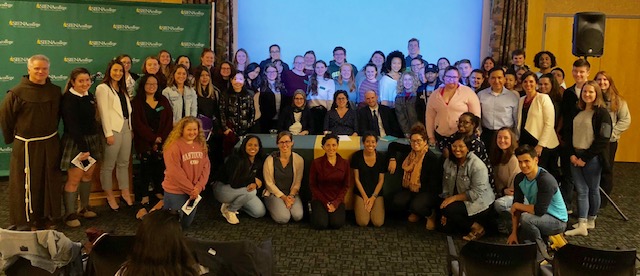As a college campus located ten minutes away from a refugee center, the issues that lie within migration should not be a new concept to Siena students. However, because the hardships that female migrants face on their journeys are seldom told, many of us fall ignorant to the severity of the matter. On Wed. Oct. 17, Siena welcomed a panel of speakers to share their knowledge on the topic of the gendered nature of migration. “Crossing the Border: Women in Migration” centered on the situations of vulnerability that female migrants are too often forced into and the policy changes that currently being put into place to fit their needs.
Michael Stewart Evans, a Policy Analyst at UN Women, began the evening by introducing the crowd to the idea of a protection gap, or having no government assistance to migrate. While migrating with no help from the government is extremely dangerous, the risks involved heighten significantly if the migrant is a woman, explained Evans. This is the intersection between gender and migration; women are more likely to be assaulted, raped and murdered than men during their journeys. Evans stated that these concerns have been recognized by the United Nations and that they have responded by creating the first-ever international agreement addressing these migration issues: the Global Compact for Migration. The ultimate goal of the compact is to change the narrative of migration to people choosing to leave their homeland only if they wish to, not because they feel they need to for their own safety. “We can’t have policies telling women they cannot migrate,” remarked Evans. Therefore, while many women still must seek asylum in migrating illegally, the UN will do what it can to support them by meeting their gender-specific migrating needs.
Next to speak was the Representative at the UN for Franciscans International, Marina El Khoury. Her organization makes a direct impact with migrant women by providing shelters of safety for the women. Within these shelters, the women are given whatever kind of care they need while making their perilous migration. Currently working with Franciscans International, one of their core beliefs is that advocacy is the most important part of creating a change. El Khoury expressed that she works to bring the concerns of migrant women, that are often ignored, directly to the policymakers. She concluded by noting that the Global Compact for Migration is still flawed and that she is working to change that, but that we are headed in the right direction.
To finish off the forum was a true story from a refugee in Albany told by Mevlüde Akay. Akay holds an LL.M. from Harvard Law School and currently serves the immigrant community in our very own Capital Region. Without a doubt the most heart-wrenching part of the night, Akay spoke of a woman, Pamela, desperately trying to save herself and family from gang violence in their homeland of El Salvador. With many attacks on her daughter’s life and no help from her local officials, Pamela needed to leave to save herself and, hopefully, her family. After being raped and physically assaulted, her terrible migration ended with border portal finding her covered in her own blood in a river. Akay said that Pamela was held in a detention center by border portal for two months and then granted asylum in Troy, New York. Unfortunately, before she could petition for her daughter to be brought the U.S, Pamela’s daughter was murdered by a gang member. Today, Pamela struggles with severe depression and PTSD because of the horrors she faced trying to escape the equally horrific conditions in El Salvador. Akay commented that Pamela was one of the luckier female refugees, as most face similar hardships, but do not survive the journey.
The “Crossing the Border: Women in Migration” forum was made possible by Siena’s Sr. Thea Bowman Center for Women and the Pre-Law Society. The panel shed light onto the experiences people who do not typically get a voice in mainstream America. Furthermore, it emphasized the fact that these issues are not foreign, as they exist within our own communities. Essentially, all of the panelists expressed that they believe while today women voices are finally being heard to some extent, there is still much progress to be made.

